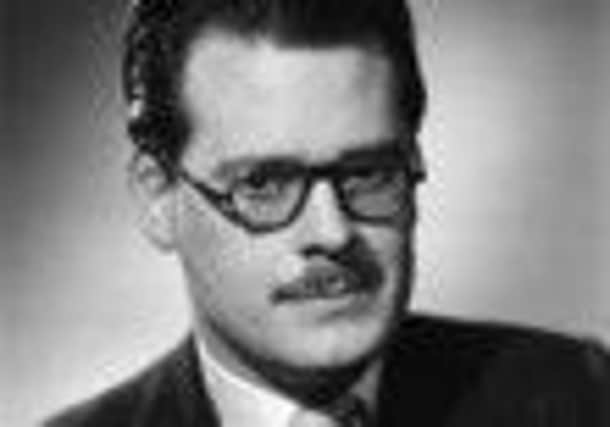Obituary: Anthony Hinds, film producer and writer


When Anthony Hinds started working at his father’s film business after the Second World War, it was an inconsequential little company making cheap little films that could be slotted in as the bottom half of a double bill. By the early 1960s he had transformed it into one of the most recognisable brands in British entertainment.
Hammer ranked alongside the Beatles and Bond as a cultural landmark and one of Britain’s big international success stories of its era.
Advertisement
Hide AdAdvertisement
Hide AdThe company, for which Hinds worked for more than 20 years as studio boss, producer and writer, drew its material from old books and ancient legends. But it gave them a makeover that exploited the more relaxed rules on censorship and presented a heady mix of Gothic horror, blood in all its gaudy Technicolor glory, sex, nudity and violence.
The Curse of Frankenstein and the follow-up Dracula were controversial when they came out in the late 1950s, but they were international hits and laid the foundations for a string of commercially successful films in the 1960s and 1970s.
Frankenstein cost around £65,000 and grossed about $7 million in the US. Hammer received the Queen’s Award for Industry in 1968 for its contribution to Britain’s exports.
The name Hammer suggests menace, a blunt instrument, a threat of violence, but the origin was entirely innocent. It was Hinds’ father’s stage name when he was a comedian, an abbreviation of Hammersmith, where he was living at the time.
The father, William Hinds, worked in the family’s jewellery business, and then diversified into barbers’ shops, bicycles and theatres, which gave him the chance to perform himself. His son Anthony Frank Hinds was born in the Hillingdon area on the outskirts of London in 1922.
In the mid-1930s Hinds Senior set up Hammer Film Productions and Exclusive Films, a distribution company that he established with Enrique Carreras. Hammer, in its original incarnation did not last long, but Exclusive Films continued.
Anthony Hinds worked there briefly before the Second World War, in which he served with an RAF photographic unit in the South-east Asia.
Hammer was revived after the war as the production arm of Exclusive and William Hinds and Enrique Carreras passed on the running of the companies to their sons.
Advertisement
Hide AdAdvertisement
Hide AdAnthony Hinds and James Carreras made a strong team. Carreras freely admitted he was driven by the pursuit of profit, not art. Hinds was the man with the imagination, leading the search for the sort of films that would deliver those profits.
His earliest productions include Dick Barton Strikes Back and The Adventures of PC 49: Investigating the Case of the Guardian Angel, adaptations of popular radio shows, and also The Saint’s Return. But it was Hammer’s film version of the television serial The Quatermass Experiment that pointed to their future with horror and monsters.
The television version caused a stir in 1953. The story of an astronaut who returns from a mission and slowly transforms into a blob-like monster, it combined documentary realism and genuine terror.
Television was just taking off and there were no video or iPlayer replay options. Hinds felt there was further potential in Quatermass and had a big-screen remake in cinemas within two years, dropping the E from the title to make it The Quatermass Xperiment, playing up the adults-only X certificate.
Hammer took a further step towards “creature features”, with The Abominable Snowman and pretty much perfected the formula with Frankenstein and Dracula, both of which starred Peter Cushing and Christopher Lee. They became the biggest stars of the studio and indeed the entire horror genre.
The studio shamelessly revived Frankenstein and Dracula time and again, and created or sometimes literally resurrected an entire mythology of monsters, including werewolves, mummies and any number of naked lesbian vampires.
No one understood the appeal of the Hammer product better than Hinds and increasingly he became involved in the films as writer, employing the pseudonym John Elder, as well as producer.
He wrote the scripts for more than a dozen films between 1960 and 1975, including The Curse of the Werewolf, starring Oliver Reed as the man who goes all hairy when the moon is full, The Phantom of the Opera, The Kiss of the Vampire, The Reptile, Rasputin the Mad Monk, Frankenstein Created Woman, Dracula Has Risen from the Grave, Taste the Blood of Dracula and Frankenstein and the Monster from Hell.
Advertisement
Hide AdAdvertisement
Hide AdBy the early 1970s Hinds had stepped back from the management of Hammer, following a number of disagreements. Latterly he felt Hammer was going too far with some of the sexual content of the films. He continued to write for it, including contributing to the Hammer House of Horror television series in 1980.
He never courted media or public attention and latterly kept a fairly low profile, eschewing fan conventions, though he contributed to several documentaries about the studio and wrote and acted in amateur drama.
He is survived by his wife and two daughters.